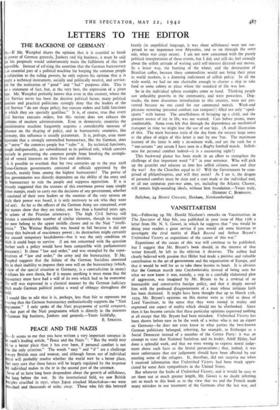LETTERS TO THE EDITOR
THE BACKBONE OF GERMANY
Sts,—If Mr. Westphal shares the opinion that it is essential to break power of German generals, Junkers and big business, it must be said that his proposals would unfortunately make the fulfilment of this task possible. Instead of refuting the assertion that the German bureaucracy an essential part of a political machine for keeping the common people subjection to the ruling powers, he only repeats his opinion that it is =ply a technical instrument, socially and politically neutral, and service- ible for the realisation of " good " and " bad " purposes alike. This is t a statement of fact, but, at the very best, the expression of a pious pe. Mr. Westphal probably knows that even in this country, where the vu l Service never has been the decisive political factor, many political eorists and practical politicians strongly deny that the leaders of the Civil Service "do not shape policy, but execute orders and fulfil functions r which they are specially qualifieo." It is, of course, true that every Civil Service executes orders, but this truism does not exhaust the roblems of modern administration. Even in democratic countries the istrative machine frequently acquires a considerable measure of sfluence on the shaping of policy, and in bureaucratic countries, like rmany, this influence is usually paramount. It is, perhaps, even more portant that a strongly entrenched bureaucracy, like the German, does t " serve " the common people but " rules " it. Its technical functions, ugh indispensable, are subordinated to its political role, which consists secisely in preventing the common people from breaking the strangle- Id of vested interests on their lives and destinies.
Is it possible to overlook that for two centuries up to the year 1918 so-German governments consisted of officials appointed by the narch, mainly from among the highest bureaucrats? The power of se governments was directly dependent on the ability of the army and bureaucracy to rule the people and suppress opposition. If it is ously suggested that the trustees of this enormous power were simply bber stamps, ready to carry out the decisions of any government, whether consisted of their own leaders or the enemies of the very system on h their power was based, it is only necessary to ask who they were and are). As far as the officers of the German Army are concerned, even r names show that they are today, not less than a hundred years ago, the scions of the Prussian aristocracy. The high Civil Service still tains a considerable number of similar elements, though its majority y now belong to the upper middle classes and to the Nazi " intelli- ntsia." The Weimar Republic was bound to fail because it did not troy this bulwark of reactionary power ; its destruction might certainly ye caused temporary breakdowns—but it was the only condition on hich it could hope to survive. (I am not concerned with the question lecher such a policy would have been compatible with parliamentary ocracy.) It chose "law and order," and was strangled by the repre- atives of "law and order," the army and the bureaucracy. If Mr. estphal suggests that the failure of the German Socialists consisted y in their inability to impress their own will on the bureaucracy (which, view of the special situation in Germany, is a contradiction in terms) refutes his own thesis, for if it means anything it must mean that the eaucracy must have had a will of its own which had to be overcome. is will was expressed in a classical manner by the German judiciary *ch made German political justice a word of obloquy throughout the d.
I would like to add that it is, perhaps, less than fair to represent me saying that the German bureaucracy enthusiastically supports the "Nazi ramme." I only spoke of the Nazi programme of world conquest, , that part of the Nazi programme which is directly in the interests German big business, Junkers and generals.—Yours faithfully,
E. &muss.






















 Previous page
Previous page